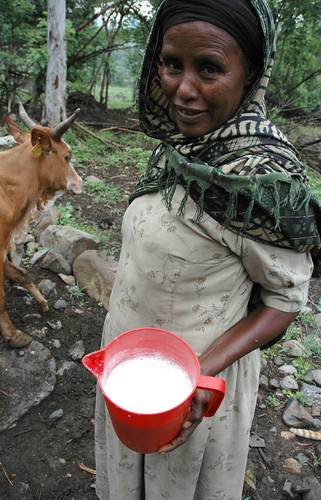The safety of milk and dairy products in Ethiopia can be significantly improved through participatory risk assessment approaches to traditional methods of food production, reports a study published in the 4 November 2011 issue of the International Journal of Food Microbiology.
The study was carried out to assess the risk of staphylococcal poisoning through traditionally fermented milk in Debre Zeit, Ethiopia. Staphylococcus aureus is a bacterium that can cause mastitis (udder infection) in dairy cows. It can also cause food poisoning through production of an enterotoxin.
Traditional souring of milk is carried out by leaving raw milk in a gourd to ferment spontaneously for 1-2 days through the action of the naturally occurring milk microflora. The organic acids produced during fermentation inhibit the growth of spoilage micro-organisms, thereby prolonging the storage life of the milk.
The study, which is part of research by the BMZ- funded Safe Food, Fair Food project, found that home-made traditionally fermented milk in Debre Zeit, Ethiopia reduced the risk of food poisoning by Staphylococcus aureus by 93.7%.
The research was collaboratively undertaken by scientists from the Market Opportunities theme of the International Livestock Research Institute (ILRI) and Addis Ababa University.
Principal author Dr Kohei Makita is a veterinary epidemiologist on joint appointment with ILRI and the Rakuno Gakuen University in Japan while co-author Dr Delia Grace is a veterinary epidemiologist and leader of ILRI's research team on animal health, food safety and zoonoses.
Read the abstract.
Citation
Makita K, Dessisa F, Teklu A, Zewde G and Grace D. Risk assessment of staphylococcal poisoning due to consumption of informally-marketed milk and home-made yoghurt in Debre Zeit, Ethiopia. International Journal of Food Microbiology (2011), doi:10.1016/j.ijfoodmicro.2011.10.028
The study was carried out to assess the risk of staphylococcal poisoning through traditionally fermented milk in Debre Zeit, Ethiopia. Staphylococcus aureus is a bacterium that can cause mastitis (udder infection) in dairy cows. It can also cause food poisoning through production of an enterotoxin.
Traditional souring of milk is carried out by leaving raw milk in a gourd to ferment spontaneously for 1-2 days through the action of the naturally occurring milk microflora. The organic acids produced during fermentation inhibit the growth of spoilage micro-organisms, thereby prolonging the storage life of the milk.
The study, which is part of research by the BMZ- funded Safe Food, Fair Food project, found that home-made traditionally fermented milk in Debre Zeit, Ethiopia reduced the risk of food poisoning by Staphylococcus aureus by 93.7%.
The research was collaboratively undertaken by scientists from the Market Opportunities theme of the International Livestock Research Institute (ILRI) and Addis Ababa University.
Principal author Dr Kohei Makita is a veterinary epidemiologist on joint appointment with ILRI and the Rakuno Gakuen University in Japan while co-author Dr Delia Grace is a veterinary epidemiologist and leader of ILRI's research team on animal health, food safety and zoonoses.
Read the abstract.
Citation
Makita K, Dessisa F, Teklu A, Zewde G and Grace D. Risk assessment of staphylococcal poisoning due to consumption of informally-marketed milk and home-made yoghurt in Debre Zeit, Ethiopia. International Journal of Food Microbiology (2011), doi:10.1016/j.ijfoodmicro.2011.10.028


No comments:
Post a Comment